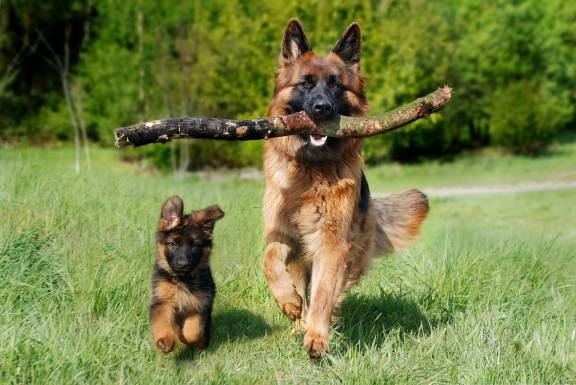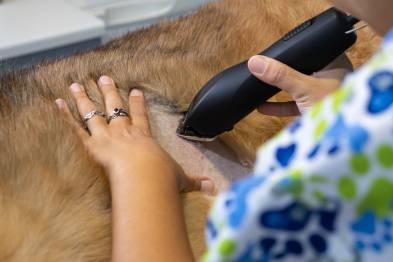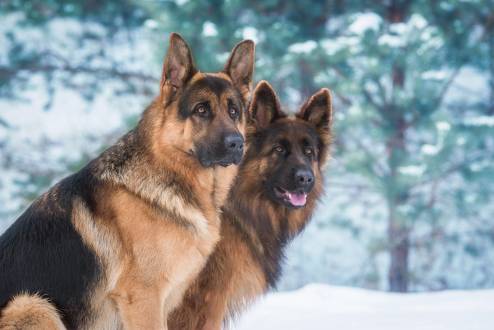Have you recently adopted a German Shepherd dog? Do you have a new German Shepherd puppy? Does your Germany Shepherd need some training? If so, then you’ve come to the right place!
Connect with a verified veterinarian in minutes. Licensed vets are available 24/7 to answer your questions. No need to worry about your furry family member.
German Shepherds are a highly popular dog breed and there’s a reason for that. These dogs are highly intelligent working dogs, that also make loving and loyal companion animals. However, these fur babies do need to have proper training and socialization to become the best they can be.
A Little History of the German Shepherd Breed
As the names lets us know, the breed originated in Germany. The story goes that back in 1889, a dog show in Karlsurhue, Western Germany, a beautiful wolf-like dog capture the attention of a man named Captain Max von Stephanitz. He noticed this intelligent dog and purchased him. The dog’s name was Hektor Linksrhein, but von Stephanitz renamed his new dog Horand von Grafrath. And this dog became the first-ever registered German Shepherd dog.
From there, the dog breed eventually made its way to the US in the early 1900s. And in 1913, the German Shepherd Dog Club of America was formed. These dogs became famous being wonderful companions and working dogs.
German Shepherd Characteristics
These are large, agile, highly intelligent working dogs. So, they need a lot of space to release all their pent-up energy and for room to exercise. They’re highly loyal to their family, but usually pick one family out and dedicate themselves completely to this person. When it comes to health, German Shepherds are prone to certain issues such as hip dysplasia, bloat and aortic stenosis.
In addition, these are large dogs. Males are can weigh in between 77-95 lbs and be 24-26 inches high, while females can weigh between 55-73 lbs and be 22-24 inches high. Their lifespan is about 9 to 13 years, though some have been known to live longer. When it comes to colors, the German Shepherd breed comes in black/tan and red/black. You may be more familiar with the dogs who have black masks and black body markings, such as the black “saddle” on their back. You can also find these dogs in rarer colors such as sable, all black, all white, and even blue. With these beautiful colors, the breed’s coat is double and includes an outer coat (which sheds all year round) and a thick undercoat.
And did we mention these dogs are highly intelligent? They have been bred specifically bred for this trait. In fact, the breed is sometimes ranked as third for intelligence, coming in behind Border Collies and Poodles! German Shepherds are known for their ability to quickly learn a new task and their obedience on the first command (about 95% of the time). When combined with their strength, they have become known for their ability to do many jobs. German Shepherds were originally bred for herding cattle and guarding sheep. They also work with the police and military, as well as being trained as search and rescue dogs and more.
When it comes to temperament, this breed is considered to be highly self-assured. They are trainable and want to be trained, and they have great curiosity. While they are used as guard dogs, they do sometimes have a tendency to become overprotective of their family and home. They don’t make friends easily (or right away) with strangers. For this reason, German Shepherds do require proper socializing and training. As you can see, German Shepherds are wonderful, agile, and intelligent dogs! However, they do require training and proper socialization in order to be a great family dog.

Review symptoms, medications & behavior to keep your pets healthy with a Vet Online in just minutes.
Ask a Vet Live NowHow to Train a German Shepherd Puppy
A German Shepherd puppy will need quite a bit of training. This isn’t because they aren’t very smart; quite the contrary. It’s because they’re so intelligent that a puppy will need to be trained on how to use that intelligence to his benefit and yours. Positive training methods are the best for this sensitive breed.
Here are some tips to help you train your German Shepherd puppy:
1). Socialize your puppy: this means taking him to the vet for shots and getting used to being checked. Then get him enrolled in puppy training classes, or even a puppy socialization class. The best time to start is when your puppy is about 4-6 months old. And then you’ll need to spend time socializing with your puppy, too. This means playing with him, training him, etc.
2). Teach your puppy how to use his mouth properly: puppies will bite and teethe on anything, including your hand or fingers! They may also choose to use their teeth on furniture, clothing and more. This is normal puppy behavior. However, your German Shepherd puppy needs to understand that his teeth can cause pain. So, he’ll need to learn how much pressure to apply when he’s biting different things. While you’re at it, you’ll also need to train the puppy on what is OK to bite/chew and what isn’t.
3). Potty train your puppy: this will take some patience and keep in mind that each puppy is an individual and will learn at his own rate. You can start by taking your puppy out to go potty right after he’s had a meal. Then take him out directly after he wakes from a nap, and again after a playing session. And remember to praise him each time for going outside! Never punish your puppy for having an accident. This will happen. Just be calm and take him right outside so he gets the message.
4). Use treats for training: this is a great way to encourage a puppy to learn! Treats are a way to motivate the puppy and reward him. Food is a high-value item for dogs and puppies, so it’s good to use treats when training your little puppy.
5). A puppy needs to learn how to do the same thing in different places: because puppies can’t generalize a new concept they’ve learned, it will be necessary to teach your puppy new things in different places. For instance, if you teach him to sit in the living room, then you’ll need to show him again in the kitchen, outside, etc. This is normal, so be patient as your puppy starts to learn these new things!
6). Train your German Shepherd puppy not to jump: now’s the time to train your puppy not to jump up on you and others. If you don’t, then when he gets to be larger, he could hurt someone by knocking them down. So, now’s the time to teach him not to jump.
7). Teach your puppy not to pull on the leash: this is another behavior that can be bad when a dog becomes larger. For now, your puppy probably isn’t big enough to pull you down the street. However, when he gets to be an adult, if you don’t train him not to pull, he could take off running, dragging you behind if he sees another dog, etc. This happens! When you have your puppy out walking, reward him for not pulling. You can do this by giving him a treat and be sure to praise him!
These are some tips for German shepherd puppy training. The keys here positive reinforcement, repetition, patience, and lots of praise. Always praise your fur baby and use only positive reinforcement. Never punish your puppy when he doesn’t get things right. Remember, he’s a baby and it takes time for him to learn. Just give him a lot of love and attention, and he’ll get there!
German Shepherd Training Tips
Here are great books on training your German Shepherd dog! You’ll find some wonderful advice on training your dog!
- Your German Shepherd Puppy Month by Month, 2nd Edition: this is a great book for new pet parents of a German Shepherd puppy! The book walks you through each stage of growth from puppyhood to adulthood, how to potty train, what to do if your puppy cries at night and more.
- German Shepherd Training: The Beginner’s Guide to Training Your German Shepherd Puppy: this is another beginner’s guide to training German Shepherd puppies. It teaches you how to discipline your puppy, potty train, basic obedience training and much more.
- The German Shepherd Handbook: this is a reference book especially geared toward new pet parents of a German Shepherd. You’ll learn all about the breed, find tips on training, and much more.
How to Find German Shepherd Training Near Me
If you’re a new pet parent and would like some additional help with training your German Shepherd, then you can search for a dog trainer near you. To do this, you can ask your vet for a referral to a professional dog trainer. You can also check with family, friends, colleagues at work, etc. Another way to find a dog trainer is to use Google. Just open your browser and type in this term “German Shepherd dog training near me,” but leave off the quotation marks. Then hit enter, and in a few short seconds you should see a map that lists dog trainers in your area.
Look for a trainer who offers the type of service you need. For example, if you need to socialize your puppy, then look for trainers who provide this type of training. And then you’ll need to decide if you and your puppy need one-on-one training, or to be in a group. Groups are a great way for your dog or puppy to learn how to socialize. And make sure the trainer uses positive reinforcement methods when training. You want your fur baby to be happy, have fun and learn all at the same time. He won’t learn if the trainer is mean, etc. Lastly, look for a trainer you like, too. A trainer works with both dogs and their pet parents, so the trainer needs to also have good people skills.
When you find some trainers that may be a good choice, contact them and see if you can sit in on some classes. Watch to see how the trainer interacts with both the people and their dogs. Avoid trainers that use training methods that are not humane or seem cruel. Use your gut instincts and you won’t go wrong.
We’d like to wish you and your German Shepherd many years of happiness and fun together!!
Connect with a verified veterinarian in minutes. Licensed vets are available 24/7 to answer your questions. No need to worry about your furry family member.

Tom
Tom has always loved to write since he was little - he wanted to be either a writer or a veterinary doctor, but he ended up being a professional writer while most of his works are based on animals. He was born in San Francisco but later moved to Texas to continue his job as a writer. He graduated from the University of San Francisco where he studied biotechnology. He is happily married and a soon to be father!
Review symptoms, medications & behavior to keep your pets healthy with a Vet Online in just minutes.
Ask a Vet Live Now



